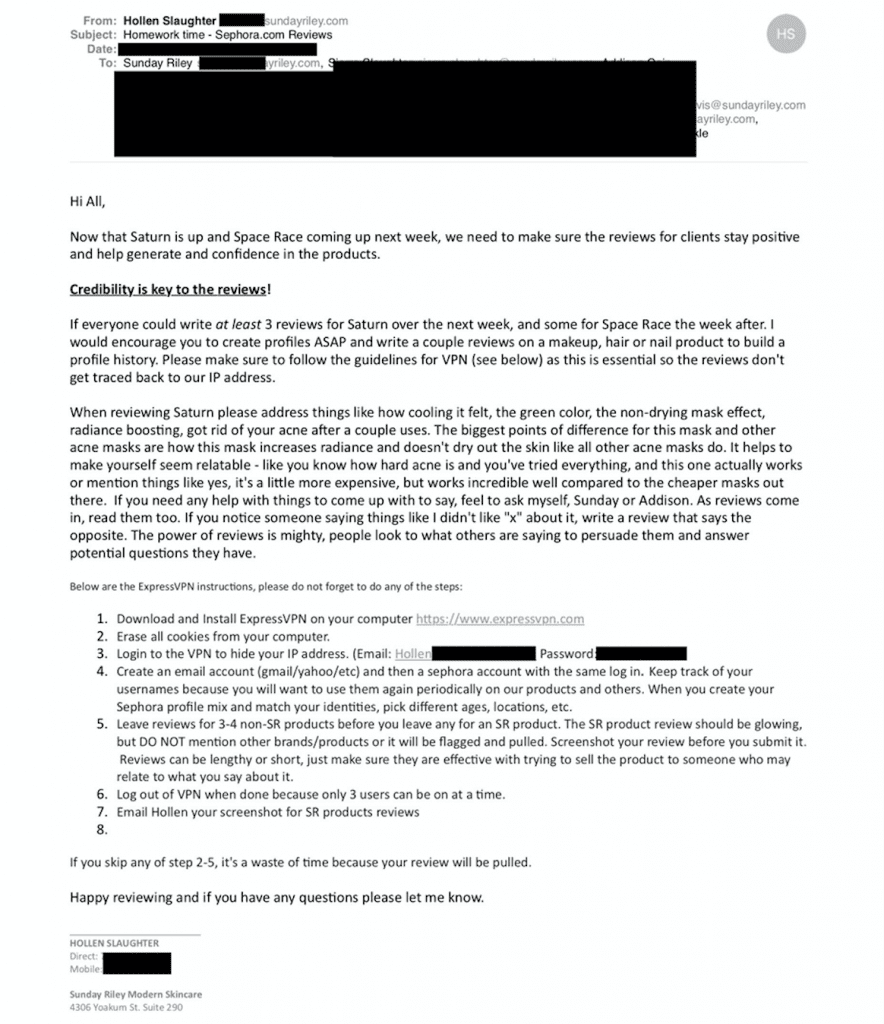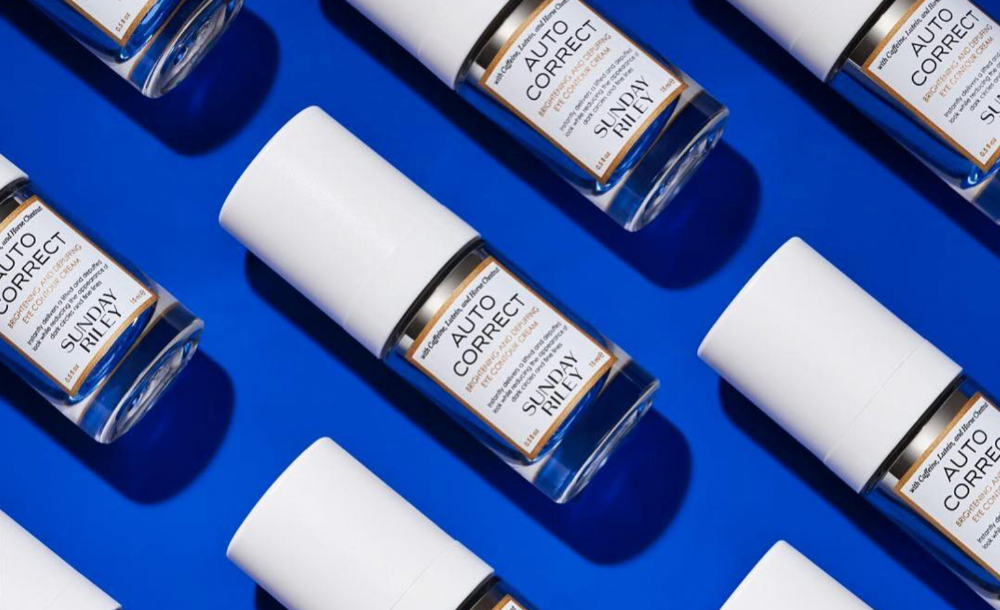“We write fake reviews on Sephora.” That is what a former Sunday Riley employee revealed about the buzzy skincare company. According to an internal email from the company to a number of employees, Sunday Riley has been in the business of enlisting those within its ranks to post “at least 3” positive reviews about its products – under the guise of an unaffiliated consumer, as opposed to a Sunday Riley employee – in order to entice consumers to purchase its various skincare goods.
The email, which was sent to a long list of Sunday Riley employees, called on the individuals to go to great lengths to mislead consumers as to their identities. For instance, the email suggests that employees build up a “profile history” of reviews of non-Sunday Riley products before writing reviews for the brand. Additionally, the email notes that “it helps to make yourself seem relatable [in your reviews], like you know how hard acne is and you’ve tried everything, and this one actually works or mention things like, yes it’s a little more expensive but works incredibly well compared to the cheaper masks out there.”
Still yet, the email alerted employees to take steps to ensure that their IP addresses were masked, so that each employee could post multiple reviews and avoid being flagged by Sephora’s spam comment-flagging system.
Since surfacing on Reddit last week, a representative for 9-year old, Houston, Texas-based brand Sunday Riley has confirmed the authenticity of the email, stating on Instagram, “The simple and official answer to this Reddit post is that yes, this email was sent by a former employee to several members of our company. At one point, we did encourage people to post positive reviews at the launch of this product, consistent with their experiences.” The rep goes on to note that the brand has “hundreds of thousands of reviews across platforms around the globe and it would be physically impossible for us to have posted even a fraction of these reviews.”
The fake endorsement scandal comes amidst large-scale allegations of fraud within the beauty industry. In August, influencer and beauty brand owner Marlena Stell revealed in a highly-watched YouTube video that “social climbing influencers” are regularly demanding “massive amounts of money” in exchange for coverage on social media or YouTube – or to avoid negative coverage. “People only talk about the products of [the companies] that pay them the most,” Stell said.
In an Instagram post following from Stell’s video, Emmy Award winning makeup artist Kevin James Bennett called out the “mobster-like behavior of top-level beauty influencers and their management.” Specifically, he cited an interesting rate that he was given from the management company for “a top-level beauty influencer.” For “$75K to $85K,” the influencer would provide “a dedicated negative review of a competitor’s product (price determined by length of video).”
The legality of the posting of positive and/or negative reviews is arguably quite straightforward. The Federal Trade Commission requires that all endorsements that result from a “material connection” between a brand and an influencer, including compensation or an affiliation that consumers would not expect, must be “clearly and conspicuously” disclosed, hence the “ad” or “partnership” hashtags that can be found on some influencers’ social media posts. The same disclosure requirement apply when a brand’s employees post reviews about its products.

Beyond the FTC, though, the posting of reviews – either positive or negative – can give rise to an array of other legal issues, as well. Many states have laws that specifically speak to false advertising and the posting of deceptive reviews. In New York, for instance, state law prohibits the “preparing or disseminating a false or deceptive review that a reasonable consumer would believe to be a neutral, third-party review.” Claims such as product disparagement, defamation, tortious interference, and/or unfair competition, among others, could also potentially be made in connection with false negative reviews.
In the case of Sunday Riley, even if the employees are posting reviews that accurately reflect their experiences in using the products, they would need to disclose their positions as employees of the brand in order for their comments to be in line with U.S. advertising law.
This is not the first time that Sunday Riley has come under fire for allegedly misleading consumers. In late 2016, Sunday Riley was slapped with a class action lawsuit by two consumers, who alleged that the brand falsely advertised the efficacy of one of its anti-aging creams. According to that suit, which settled in February 2017, “Like a modern-day snake oil salesman, Sunday Riley preys on consumers’ fundamental fear of aging by marketing the [cream] as if it were an FDA-approved drug that could change the physical structure and function of skin itself.”
A representative for Sephora told TFL, “At Sephora, we believe in the power of the beauty community and that knowledge should be shared to benefit all. Sephora has very strict brand rules regarding our Ratings and Reviews, which we know are an important decision tool for our clients. Additionally, we have teams dedicated to protecting the integrity of our Ratings and Reviews, ensuring through detailed moderation that it’s a constant trusted, unbiased, authentic source for all.”
The rep further noted, “We do not believe this incident is representative of the Sephora Ratings and Reviews culture, or the countless hours our clients have spent sharing their product experiences with us and others. We’ve been in touch with Sunday Riley on this matter, and they have committed to adhering to our review policy.”














